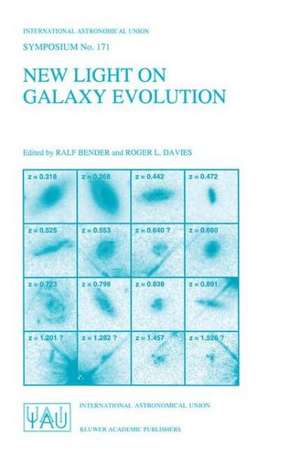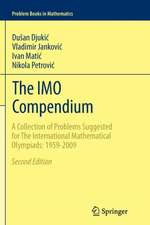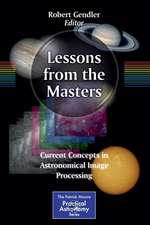New Light on Galaxy Evolution: Proceedings of the 171st Symposium of the International Astronomical Union, Held in Heidelberg, Germany, June 26–30, 1995: International Astronomical Union Symposia, cartea 171
Editat de Ralph Bender, Roger L. Daviesen Limba Engleză Paperback – 31 mar 1996
Din seria International Astronomical Union Symposia
-
 Preț: 132.74 lei
Preț: 132.74 lei -
 Preț: 404.67 lei
Preț: 404.67 lei -
 Preț: 400.65 lei
Preț: 400.65 lei -
 Preț: 412.95 lei
Preț: 412.95 lei - 15%
 Preț: 660.68 lei
Preț: 660.68 lei - 15%
 Preț: 654.43 lei
Preț: 654.43 lei -
 Preț: 407.98 lei
Preț: 407.98 lei - 18%
 Preț: 1238.74 lei
Preț: 1238.74 lei - 15%
 Preț: 659.53 lei
Preț: 659.53 lei -
 Preț: 409.89 lei
Preț: 409.89 lei - 18%
 Preț: 1556.77 lei
Preț: 1556.77 lei - 18%
 Preț: 1852.43 lei
Preț: 1852.43 lei - 18%
 Preț: 1235.57 lei
Preț: 1235.57 lei -
 Preț: 419.14 lei
Preț: 419.14 lei -
 Preț: 414.52 lei
Preț: 414.52 lei -
 Preț: 417.41 lei
Preț: 417.41 lei - 15%
 Preț: 647.73 lei
Preț: 647.73 lei - 18%
 Preț: 967.56 lei
Preț: 967.56 lei - 18%
 Preț: 1236.06 lei
Preț: 1236.06 lei -
 Preț: 407.39 lei
Preț: 407.39 lei - 15%
 Preț: 654.12 lei
Preț: 654.12 lei -
 Preț: 416.26 lei
Preț: 416.26 lei - 18%
 Preț: 960.78 lei
Preț: 960.78 lei - 18%
 Preț: 1239.67 lei
Preț: 1239.67 lei - 18%
 Preț: 1239.85 lei
Preț: 1239.85 lei -
 Preț: 416.26 lei
Preț: 416.26 lei -
 Preț: 421.82 lei
Preț: 421.82 lei - 18%
 Preț: 1238.42 lei
Preț: 1238.42 lei -
 Preț: 416.26 lei
Preț: 416.26 lei -
 Preț: 405.28 lei
Preț: 405.28 lei - 18%
 Preț: 1220.54 lei
Preț: 1220.54 lei - 18%
 Preț: 1239.19 lei
Preț: 1239.19 lei - 18%
 Preț: 961.41 lei
Preț: 961.41 lei -
 Preț: 407.39 lei
Preț: 407.39 lei - 18%
 Preț: 961.86 lei
Preț: 961.86 lei - 15%
 Preț: 652.49 lei
Preț: 652.49 lei - 18%
 Preț: 1238.74 lei
Preț: 1238.74 lei - 18%
 Preț: 962.49 lei
Preț: 962.49 lei
Preț: 400.10 lei
Nou
Puncte Express: 600
Preț estimativ în valută:
76.56€ • 79.94$ • 63.22£
76.56€ • 79.94$ • 63.22£
Carte tipărită la comandă
Livrare economică 15-29 aprilie
Preluare comenzi: 021 569.72.76
Specificații
ISBN-13: 9780792339762
ISBN-10: 0792339762
Pagini: 500
Ilustrații: 500 p. 137 illus., 1 illus. in color.
Dimensiuni: 160 x 240 x 26 mm
Greutate: 0.7 kg
Ediția:Softcover reprint of the original 1st ed. 1996
Editura: SPRINGER NETHERLANDS
Colecția Springer
Seria International Astronomical Union Symposia
Locul publicării:Dordrecht, Netherlands
ISBN-10: 0792339762
Pagini: 500
Ilustrații: 500 p. 137 illus., 1 illus. in color.
Dimensiuni: 160 x 240 x 26 mm
Greutate: 0.7 kg
Ediția:Softcover reprint of the original 1st ed. 1996
Editura: SPRINGER NETHERLANDS
Colecția Springer
Seria International Astronomical Union Symposia
Locul publicării:Dordrecht, Netherlands
Public țintă
ResearchCuprins
Spiral Galaxies. Elliptical Galaxies. Small Stellar Systems and Galaxy Cores. The Interstellar Medium. Dark Matter Halos around Galaxies. Mergers in the Local Universe. High Redshift Galaxies. Theory of Galaxy Formation. Galaxies in Formation.
Recenzii
`I do recommend this proceedings volume to interested scientists/researchers, both senior and junior, in astronomical observatories, in astronomical, astrophysical and theoretical physics departments and research institutions and the corresponding libraries. This volume (with a wealth of beautiful conference photographs) is a very good source of data, giving a more or less complete picture of the active research on galactic evolution and shedding new light on it.'
Classical Quantum Gravity, 14 (1997)
Classical Quantum Gravity, 14 (1997)














